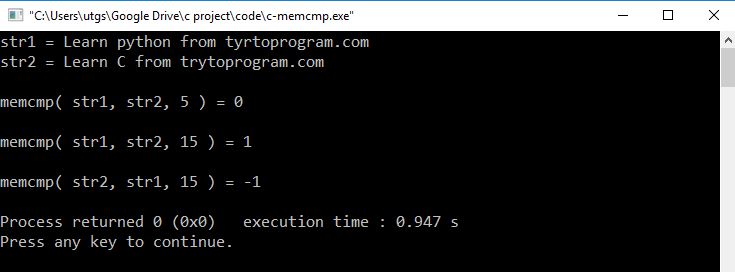In this tutorial, you will learn in-depth about C string library function memcmp() with explanation and explicit example.

memcmp() is the built-in standard library function that is defined in the string library string.h. Therefore, we should include string header library before using it.
#include<string.h>Function prototype of C string library function memcmp()
int memcmp( const void *str1, const void *str2, size_t n );where,
str1 = Pointer to the object or block of the memory
str1 = Pointer to the object or block of the memory
n = Size of content to be compared in bytes
This function compares the first n characters of the memory block pointed by str1 and str2.
memcmp( ) returns:
- zero if
str1is equal tostr2. - Less than zero if
str1is less thanstr2. - Greater than zero if
str1is greater thanstr2.
Example: Program to demonstrate the use of C string library function memcmp()
/*Use of string library function memcmp()*/
#include<stdio.h>
#include<string.h>
int main()
{
//initializing character array
char str1[ ] = "Learn python from tyrtoprogram.com";
char str2[ ] = "Learn C from trytoprogram.com";
//displaying str1 and str2
printf("str1 = %s\n", str1);
printf("str2 = %s\n", str2);
printf("\nmemcmp( str1, str2, 5 ) = %d\n", memcmp( str1, str2, 5 ));
printf("\nmemcmp( str1, str2, 15 ) = %d\n", memcmp( str1, str2, 15 ));
printf("\nmemcmp( str2, str1, 15 ) = %d\n", memcmp( str2, str1, 15 ));
return 0;
}
[adsense1]
Output

Explanation
In the above program, specified characters of str1 and str2 are compared.
A comparison is made between the ASCII value of characters.
Since, first 5 characters of both character arrays are same memcmp( str1, str2, 5 ) returns 0.
Similarly, it returns 1 and -1 after the comparison between ASCII values.